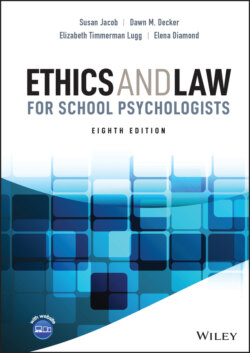Читать книгу Ethics and Law for School Psychologists - Susan Jacob - Страница 37
Competence
ОглавлениеThe NASP code of ethics requires that, “To benefit clients, school psychologists engage only in practices for which they are qualified and competent” (NASP Guiding Principle II.1; also APA Standard 2.01). As noted previously, the term competent generally suggests that the practitioner is able to integrate professional knowledge and skills with an understanding of the client and situation and make appropriate decisions, based on a consideration of both the immediate and long-term effects (Dreyfus, 1997; Nagy, 2012). Practitioners must consider their competence to provide various types of services and to use techniques that are new to them. They also must consider whether they are competent to provide services in light of client characteristics such as age; disability; ethnic, racial, and language background; and sexual orientation and gender identity. Psychologists who step beyond their competence place the student at risk for misdiagnosis, misclassification, miseducation, and possible psychological harm.
David (Case 1.2) consulted his university internship supervisor and his on-site supervisor about the special education director’s request. They discussed David’s self-assessment of his Korean language competence and his lack of prior supervised experience conducting a bilingual assessment. As a result, David met with the special educator director and offered to review Seo-yeon’s school records from Korea and conduct a screening of Seo-yeon to determine whether a full evaluation was needed. He respectfully explained why he was not qualified to conduct a comprehensive bilingual assessment of Seo-yeon if a disability is suspected. He also offered to attend school-parent meetings with Seo-yeon’s parents, noting that he would be able to help establish culturally sensitive “jeong” (rapport) with family members. In addition, David recommended that a trained interpreter attend the meetings with the parents because he was not proficient enough in Korean to explain the specialized terms used in meetings with parents of students who are struggling academically.
The students who attend our nation’s schools have become increasingly diverse in terms of race, ethnicity, language, national origin, and family composition (see Song et al., 2019). In addition, gay, lesbian, and transgender youth now “come out” at earlier ages than in previous generations, often during their middle or high school years (Jacob et al., 2010). Consequently, all practitioners must assess and periodically reassess their competence to provide services to a diverse clientele and seek the knowledge necessary to provide culturally sensitive services in the schools where they work.7 Where understanding of age, gender, race, ethnicity, national origin, religion, sexual orientation, gender identity or expression, disability, language, or socioeconomic status is essential for providing effective services, school psychologists are expected to have or to obtain the training, experience, consultation, or supervision necessary to provide effective services. If a school practitioner is not competent to provide services to a particular client, then they are obligated to consider referring the client to a professional who is qualified to provide the needed services (APA Standard 2.01; also NASP Standard II.1.1).
Many different types of personal problems can potentially impact professional functioning, including mental or physical health problems, substance abuse, personal life stressors such as divorce, and professional burnout. When school psychologists experience personal problems, they may make poor professional decisions (Koocher & Keith-Spiegel, 2016). NASP’s ethics code obligates psychologists to “refrain from any work-related activity in which their personal problems may interfere with professional effectiveness” and to “seek consultation or other assistance when personal problems arise that threaten to compromise their professional effectiveness” (Standard II.1.2). In recent years there has been increased attention to the importance of self-care among school psychologists as a protective factor to prevent or reduce burnout (see Boccio et al., 2016a ; Schilling et al., 2018). However, it is important to note that although “self-care” is identified as an aspirational principle some codes of ethics codes, it is not an enforceable standard in NASP’s code or in the codes of other helping professions.
Our codes of ethics also encourage practitioners to engage in the lifelong learning that is necessary to achieve and maintain expertise in the field of school psychology (Welfel, 2012). School psychologists are obligated to “engage in continuing professional development” and “remain current regarding developments in research … and professional practices that benefit children, youth, families, and schools” (NASP Standard II.1.3). They are encouraged to recognize that “professional skill development beyond that of the novice practitioner requires a well-planned program of continuing professional development and professional supervision” (NASP Guiding Principle II.1; also APA Standard 2.03).
